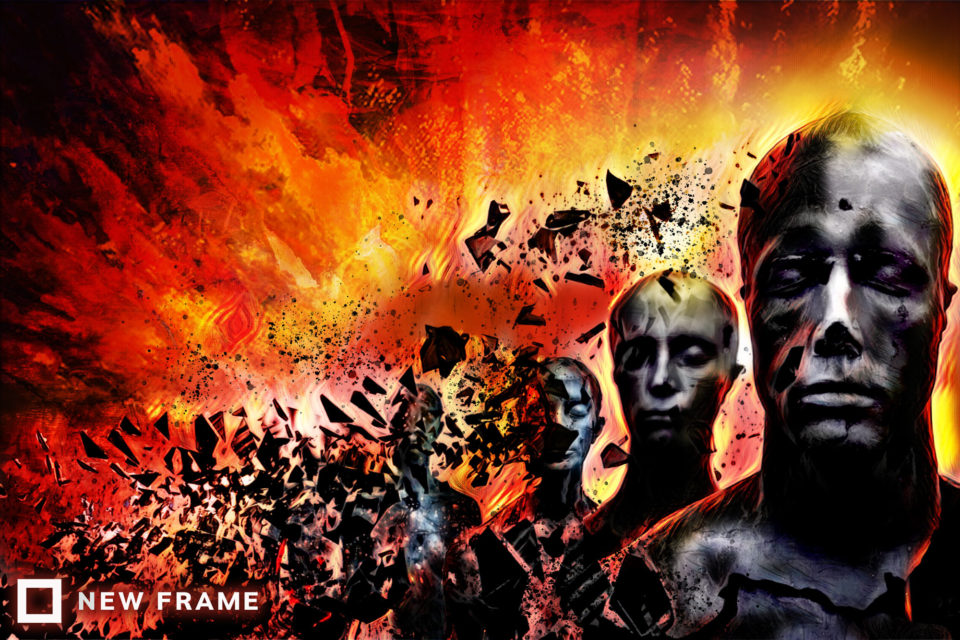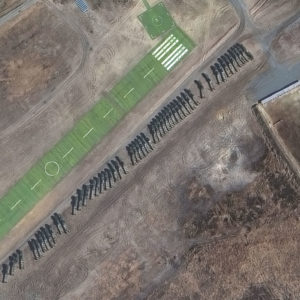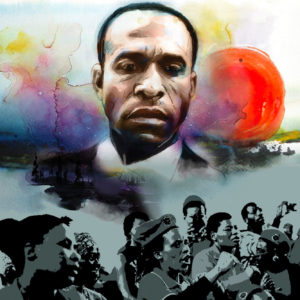The sorrow of war
The invasion of Ukraine must be opposed. But war cannot be effectively opposed by presenting the most dangerous and violent force on the planet as a benevolent guarantor of order.
Author:
4 March 2022

War is agony.
In the moments when these agonies are manifest in tearing flesh, terror and flight, it is not easy to sustain analytical lucidity. There is often, perhaps understandably, a sense that anything other than a rush to the barricades, real or metaphorical, is obscene. But what Frantz Fanon, writing in the heat of war, called “the mistrust of subtlety” always carries its own dangers.
A failure to think clearly in the midst of one war can lay the ground for a new system of oppression, or a new war. Some of the same men who fought with the Free French Forces against German fascism later fought in the failed attempt to put down the anti-colonial rebellion in Algeria, a war in which, by some estimates, well more than a million lives were lost. In some instances, the shining heroism of the uprising in the Warsaw Ghetto became entangled with the colonial violence that formed the state of Israel.
Related article:
It is imperative to remember that examination is not betrayal, contextualisation and explanation are not justification and moralism is not analysis. The agony of war is not ended by, in the name of bringing an end to one war, concealing the construction of forces and weapons that will be put to use in new wars.
We cannot know what the consequences and full cost of Vladimir Putin’s invasion of Ukraine will be, but it is certain that a terrible price will be paid by ordinary people, most immediately Ukrainians, and also Russian conscripts. The United Nations reports that more than a million people have already fled Ukraine. The invasion is an unfolding catastrophe.
The imperative to oppose the war and support the progressive anti-war movements in Russia and in the West is absolute. The attempts to paint nuanced antiwar positions in the West, such as that of British politician Jeremy Corbyn, as complicit with the invasion because they warned of the risks of escalating and expanding Western militarism are just one instance of a wider “mistrust of subtlety” that marks the current moment. Jingoism is always blindness, whether wilful or not.
A dangerous narrative
Putin, of course, is an authoritarian who leads a kleptocratic state. His recent statement that “Soviet Ukraine is the result of the Bolsheviks’ policy and can be rightfully called ‘Vladimir Lenin’s Ukraine” marks a clear rejection of Lenin’s affirmation of “the right of all nationalities to self-determination” and a reaching back to the imperial nationalism of the tsars.
We have our own reasons for despising Putin, given that he was a powerful ally of Jacob Zuma’s authoritarian kleptocracy and that his government trained Zuma’s well-armed and well-funded spies and thugs, many of whom may still be operating independently of the state. It was no surprise that Zuma’s daughter, Duduzile Zuma-Sambudla, who has become his unofficial spokesperson on social media, responded to the invasion with a public declaration of unapologetic love for Putin, or that, driven by the self-described “RET forces”, #StandWithPutin is trending on South African twitter.
Related article:
But none of this means that we should be silent on the way that Nato, despite clear warnings from informed intellectuals on the Left and the Right in the West, and even the Central Intelligence Agency, continuously escalated the potential for conflict by breaking promises, moving east and arming states close to Russia. We cannot be silent on the fact that Nato, a key instrument of American imperialism, has its own record of prosecuting war, most recently in Libya and Afghanistan.
There are real dangers in speaking as if Nato, the United States and the West offer a democratic and humane alternative to Putin. By any measure, the US has been the most violent and dangerous state on the planet since 1945. It has bombed and invaded a staggering number of countries, and organised and supported coups against an equally staggering number of governments, many elected and hugely popular, like those of Salvador Allende in Chile and Jean-Bertrand Aristide in Haiti. Its hypocrisy is rank. It blockades Cuba while supporting and arming Israel and Saudi Arabia and backing their attacks on Palestine and Yemen. In recent years, its deliberate and often militarised escalation of tensions with Russia as well as China has become an increasingly direct threat to prospects for world peace.
Weaponised media
To treat Nato, the US and the West more broadly as democratic actors on the global stage as much of the Western press does, with much of the South African media in tow, is to blind us to the horrors of many of the wars of the past and the present, and to build weapons for wars to come.
The Western press is often itself a weapon of war. We cannot forget the uncritical repetition of the lies about “weapons of mass destruction” in Iraq, nor the extreme racial double standards in the weight accorded to the lives of white victims of organised violence and the more than five million people who perished in the Second Congo War, and all the lives lost in Iraq during the presidency of George W Bush. Estimates range as high as 1.3 million.
This racism has been on crude display in recent days as journalists in some of the most powerful media institutions on the planet have repeatedly stated, sometimes explicitly using the language of race and “civilised” people and places, that the (white) victims of the war in Ukraine are, unlike people in Africa or the Middle East, worthy victims and worthy refugees.
Related podcast:
Solidarity with the victims of this war could hardly be a more urgent imperative. But while offering that solidarity we should recall that the incontestable moral authority of the Left as an idea, although not always in practice, lies in its universalism. In this regard Fanon was exemplary. He was not Jewish yet he wrote: “Anti-Semitism hits me head-on: I am enraged, I am bled white by an appalling battle, I am deprived of the possibility of being man. I cannot disassociate myself from the future that is proposed for my brother.” He fought against both fascism in Europe and colonialism in Algeria and insisted: “Every time a man has contributed to the victory of the dignity of the spirit, every time a man has said no to an attempt to subjugate his fellows, I have felt solidarity with his act.”
It is unfortunate that this language is gendered, but its meaning for us now, in this moment, is clear. We do not accept the logic of liberal racism and allow Nato, the US and the West more broadly to present themselves as humane and democratic actors with the moral right to police the planet. We do not invert the logic of liberal racism and deny the value of the lives of the victims of this war. We assert the value, the full and equal value, of the lives of every victim of every war.
Everywhere, as Vietnamese novelist Bảo Ninh wrote, “the sorrow of war… is like the immense sadness of a world at dusk”.



